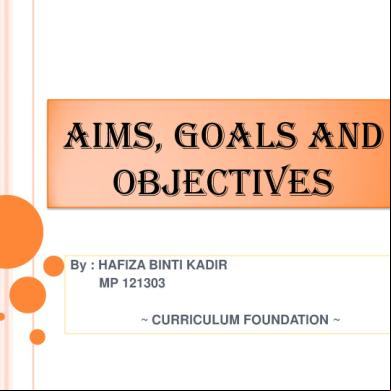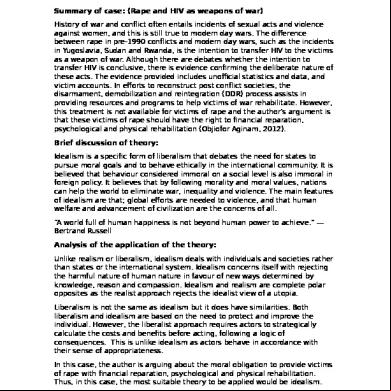Aims And Objectives 5p5h
This document was ed by and they confirmed that they have the permission to share it. If you are author or own the copyright of this book, please report to us by using this report form. Report 3b7i
Overview 3e4r5l
& View Aims And Objectives as PDF for free.
More details w3441
- Words: 1,074
- Pages: 3
Summary of case: (Rape and HIV as weapons of war) History of war and conflict often entails incidents of sexual acts and violence against women, and this is still true to modern day wars. The difference between rape in pre-1990 conflicts and modern day wars, such as the incidents in Yugoslavia, Sudan and Rwanda, is the intention to transfer HIV to the victims as a weapon of war. Although there are debates whether the intention to transfer HIV is conclusive, there is evidence confirming the deliberate nature of these acts. The evidence provided includes unofficial statistics and data, and victim s. In efforts to reconstruct post conflict societies, the disarmament, demobilization and reintegration (DDR) process assists in providing resources and programs to help victims of war rehabilitate. However, this treatment is not available for victims of rape and the author’s argument is that these victims of rape should have the right to financial reparation, psychological and physical rehabilitation (Objiofor Aginam, 2012). Brief discussion of theory: Idealism is a specific form of liberalism that debates the need for states to pursue moral goals and to behave ethically in the international community. It is believed that behaviour considered immoral on a social level is also immoral in foreign policy. It believes that by following morality and moral values, nations can help the world to eliminate war, inequality and violence. The main features of idealism are that; global efforts are needed to violence, and that human welfare and advancement of civilization are the concerns of all. “A world full of human happiness is not beyond human power to achieve.” — Bertrand Russell Analysis of the application of the theory: Unlike realism or liberalism, idealism deals with individuals and societies rather than states or the international system. Idealism concerns itself with rejecting the harmful nature of human nature in favour of new ways determined by knowledge, reason and comion. Idealism and realism are complete polar opposites as the realist approach rejects the idealist view of a utopia. Liberalism is not the same as idealism but it does have similarities. Both liberalism and idealism are based on the need to protect and improve the individual. However, the liberalist approach requires actors to strategically calculate the costs and benefits before acting, following a logic of consequences. This is unlike idealism as actors behave in accordance with their sense of appropriateness. In this case, the author is arguing about the moral obligation to provide victims of rape with financial reparation, psychological and physical rehabilitation. Thus, in this case, the most suitable theory to be applied would be idealism.
However, there is a slight hint of liberalism as well. The fact remains whether or not transmission of HIV through rape was intentional or not. If it is so, liberalists would argue that states should cooperate to prevent this and are responsible for protecting victims of war from such atrocities.
How does the theory explain/interpret the case: Through the perspective of an idealist, the case argues that there is a moral obligation to provide victims of rape with assistance. It is argued that it is clearly a case of inequality as the welfare of humans suffering from rape are not catered to as well as others involved. The only payments being given out are to those ex-combatants in the attempt of de-mobilization of the armies, resulting in the end of the war. However, no resources or programs are provided to those who have already suffered from the war. What is clear here is that the interest of the state have been catered to - the end of the war, but the social and interpersonal issues are yet to be dealt with - the victims of rape. In the end, it is a moral argument made in an attempt to achieve equality in treatment and rehabilitation amongst all persons involved in war and violence. Issues and actors identified by the theory: An idealist issue presented in the argument is that victims of rape ought to receive the right to financial reparation, psychological and physical rehabilitation. “If, as in most DDR programmes, cash payments are often made to ex-combatants for de-mobilization, there is no reason why equal payments should not be made to rape victims infected with HIV.” A liberalist issue presented in the argument is whether the transmission of HIV was intentional or not, driven by the “weaponization” of HIV. This would result in states bringing about peace as it would be in each other’s interest to fight each other. However, in the wars mentioned in the case, it seems that the wars mentioned are fought within a single state rather than states against each other. This does not mean that the possibility does not exist though. The author seems to be targeting this argument towards DDR programmes. Limitations of incentives to the actors: The main actors of the case seems to be International Non-Government Organisations (INGOs). The limitation of INGOs in addressing these issues raised by the author is a monetary limitation. INGOs generally are independent from the government and thus have no treasury of their own, working on donations and from the international community. It may be that it is not as if INGOs do not want to victims of rape, but simply do not have the funds to do so, and must address higher priorities first.
What aspects of the case do you need to emphasize and what aspects are not as important? The author seems to include the fact that HIV is to be seen as a weapon of war. The author then argues later on that victims of rape should have the right to financial reparation, psychological and physical rehabilitation. What I believe, however, is that the main argument of this case should not be whether or not HIV is to be seen as a weapon of war, but the issue of violence and rape should be the most forefront topic. From an idealist approach, rape resulting in HIV and rape not resulting in HIV are both atrocities which need to be addressed.
References: Andrew Moravcsik, Liberalism and international relations theory. Harvard Univeristy. pg, 92-96 Emilian Kavalski, (2015). Encounters with world affairs. An introduction to international relations. England Objiofor Aginam, (2012). Rape and HIV as weapons of war. UNU Press. SparkNotes Editors. (2010). SparkNote on International Politics. Retrieved October 30, 2015, from http://www.sparknotes.com/us-government-andpolitics/political-science/international-politics/ Yourarticlelibrary. (2015). Idealism: Idealism in international relations. Retreived from October 19, 2015, from http://www.yourarticlelibrary.com/internationalpolitics/idealism-idealism-in-international-relations/48471/
However, there is a slight hint of liberalism as well. The fact remains whether or not transmission of HIV through rape was intentional or not. If it is so, liberalists would argue that states should cooperate to prevent this and are responsible for protecting victims of war from such atrocities.
How does the theory explain/interpret the case: Through the perspective of an idealist, the case argues that there is a moral obligation to provide victims of rape with assistance. It is argued that it is clearly a case of inequality as the welfare of humans suffering from rape are not catered to as well as others involved. The only payments being given out are to those ex-combatants in the attempt of de-mobilization of the armies, resulting in the end of the war. However, no resources or programs are provided to those who have already suffered from the war. What is clear here is that the interest of the state have been catered to - the end of the war, but the social and interpersonal issues are yet to be dealt with - the victims of rape. In the end, it is a moral argument made in an attempt to achieve equality in treatment and rehabilitation amongst all persons involved in war and violence. Issues and actors identified by the theory: An idealist issue presented in the argument is that victims of rape ought to receive the right to financial reparation, psychological and physical rehabilitation. “If, as in most DDR programmes, cash payments are often made to ex-combatants for de-mobilization, there is no reason why equal payments should not be made to rape victims infected with HIV.” A liberalist issue presented in the argument is whether the transmission of HIV was intentional or not, driven by the “weaponization” of HIV. This would result in states bringing about peace as it would be in each other’s interest to fight each other. However, in the wars mentioned in the case, it seems that the wars mentioned are fought within a single state rather than states against each other. This does not mean that the possibility does not exist though. The author seems to be targeting this argument towards DDR programmes. Limitations of incentives to the actors: The main actors of the case seems to be International Non-Government Organisations (INGOs). The limitation of INGOs in addressing these issues raised by the author is a monetary limitation. INGOs generally are independent from the government and thus have no treasury of their own, working on donations and from the international community. It may be that it is not as if INGOs do not want to victims of rape, but simply do not have the funds to do so, and must address higher priorities first.
What aspects of the case do you need to emphasize and what aspects are not as important? The author seems to include the fact that HIV is to be seen as a weapon of war. The author then argues later on that victims of rape should have the right to financial reparation, psychological and physical rehabilitation. What I believe, however, is that the main argument of this case should not be whether or not HIV is to be seen as a weapon of war, but the issue of violence and rape should be the most forefront topic. From an idealist approach, rape resulting in HIV and rape not resulting in HIV are both atrocities which need to be addressed.
References: Andrew Moravcsik, Liberalism and international relations theory. Harvard Univeristy. pg, 92-96 Emilian Kavalski, (2015). Encounters with world affairs. An introduction to international relations. England Objiofor Aginam, (2012). Rape and HIV as weapons of war. UNU Press. SparkNotes Editors. (2010). SparkNote on International Politics. Retrieved October 30, 2015, from http://www.sparknotes.com/us-government-andpolitics/political-science/international-politics/ Yourarticlelibrary. (2015). Idealism: Idealism in international relations. Retreived from October 19, 2015, from http://www.yourarticlelibrary.com/internationalpolitics/idealism-idealism-in-international-relations/48471/










